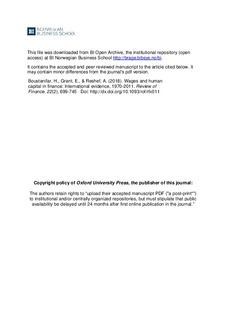| dc.contributor.author | Boustanifar, Hamid | |
| dc.contributor.author | Grant, Everett | |
| dc.contributor.author | Reshef, Ariell | |
| dc.date.accessioned | 2018-04-27T11:58:18Z | |
| dc.date.available | 2018-04-27T11:58:18Z | |
| dc.date.created | 2017-12-20T15:51:32Z | |
| dc.date.issued | 2018 | |
| dc.identifier.citation | Review of Finance, 2018, 22(2), 699-745 | nb_NO |
| dc.identifier.issn | 1572-3097 | |
| dc.identifier.issn | 1875-824x | |
| dc.identifier.uri | http://hdl.handle.net/11250/2496391 | |
| dc.description | The accepted and peer reviewed manuscript to the article | nb_NO |
| dc.description.abstract | We study the allocation and compensation of human capital in the finance industry in a set of developed economies in 1970–2011. Finance relative wages generally increase—but not in all countries, and to varying degrees. Trading-related activities account for 50% of the increases, despite accounting for only 13% of finance employment, on average. Financial deregulation is the most important factor driving up wages in finance; it has a larger effect in environments where informational rents and socially inefficient risk taking are likely to be prevalent. Differential investment in information and communication technology does not have causal explanatory power. High finance wages attract skilled international immigration to finance, raising concerns for “brain drain.” | nb_NO |
| dc.language.iso | eng | nb_NO |
| dc.publisher | Oxford University Press | nb_NO |
| dc.title | Wages and Human Capital in Finance: International Evidence, 1970-2011 | nb_NO |
| dc.type | Journal article | nb_NO |
| dc.type | Peer reviewed | nb_NO |
| dc.description.version | acceptedVersion | nb_NO |
| dc.source.journal | Review of Finance | nb_NO |
| dc.identifier.doi | 10.1093/rof/rfx011 | |
| dc.identifier.cristin | 1530598 | |
| dc.description.localcode | 2, Forfatterversjon | nb_NO |
| cristin.unitcode | 158,1,0,0 | |
| cristin.unitname | Institutt for finans | |
| cristin.ispublished | true | |
| cristin.fulltext | postprint | |
| cristin.qualitycode | 2 | |
